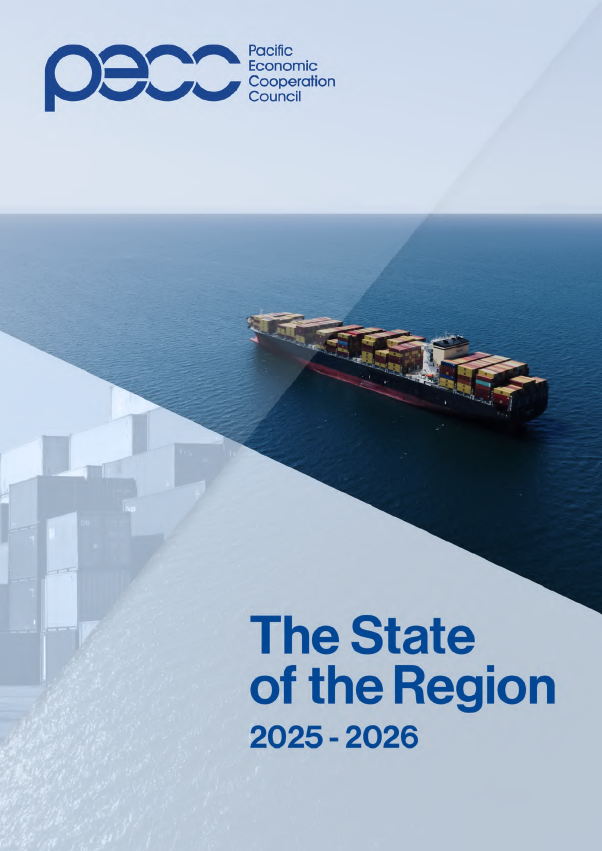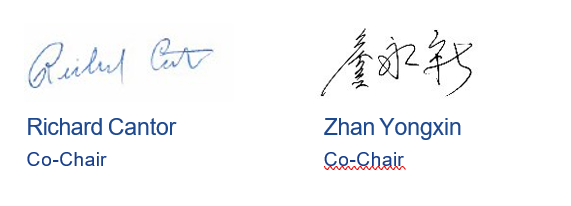Message From The Co-Chairs of PECC
 On behalf of the members of the of the Pacific Economic Cooperation Council (PECC), we are pleased to present our annual the State of the Region report. This report provides an assessment of the most pressing issues shaping the Asia-Pacific economy and the wider regional environment. We are indebted to the 504 respondents who contributed to our annual survey. This is not a survey of public opinion but a reflection of views from the regional policy community, including leaders and experts from business, government, academia, media, and civil society. Their diverse perspectives shed light on both the risks confronting the region and the opportunities to enhance cooperation.
On behalf of the members of the of the Pacific Economic Cooperation Council (PECC), we are pleased to present our annual the State of the Region report. This report provides an assessment of the most pressing issues shaping the Asia-Pacific economy and the wider regional environment. We are indebted to the 504 respondents who contributed to our annual survey. This is not a survey of public opinion but a reflection of views from the regional policy community, including leaders and experts from business, government, academia, media, and civil society. Their diverse perspectives shed light on both the risks confronting the region and the opportunities to enhance cooperation.
Key takeaways from Chapter 1 are as follows. Respondents express great concern about the potential growth implications of rising protectionism and trade wars, along with more moderate concern expressed, as in previous years, about inflation, climate change, geopolitical tensions, and supply chain resilience. Also, survey participants anticipate that governments will respond in varied ways to newly imposed or threatened tariffs, ranging from retaliation and bilateral agreements to strengthening trading relationships with other economies.
Despite a great deal of uncertainty in the international trading environment, respondents’ growth expectations for their own economies and the Asia-Pacific region as whole are fairly balanced between anticipating improvement and expecting weakening. The outlook anticipated for the rest of the world economy, however, is bleaker, likely due to other structural reasons beyond trade. What is encouraging is that even amidst the current threats to the rule- based trading system, participants express continued hope for multilateral cooperation under the auspices of the WTO, APEC, and other regional arrangements. This optimism provides a foundation for continued dialogue and problem-solving. Respondents are very clear that the top priority for APEC Leaders, when they meet in the Republic of Korea this fall, should be to mitigate the potentially harmful effects of growing protectionism and trade wars.
Chapter 2 examines how global trade is facing ongoing changes driven by political and structural shifts, rather than temporary factors. Rising protectionism surfaces concerns over unequal trade benefits and tighter economic security. New challenges ranging from digital fragmentation and supply chain resilience, and new industrial policies are reshaping trade rules. Key priorities for policymakers should include strengthening the multilateral system, ensuring regional trade deals support global rules, and advancing the green transition as a unifying goal for collective action.
We express our appreciation to the Editorial Committee which provides guidance and identifies topics of common concern and the authors, Dr Kaewkamol Pitakdumrongkit, Prof Shiro Armstrong, and Ms Sharon Zhengyang Sun, as well as efforts of the staff and interns at the PECC International Secretariat.
Access soundbite recordings on Major Risks to Asia-Pacific Growth:
(Please note when you click on the SoundCloud link, a sign-in or “create an account” prompt may appear. You can simply click the X button at the top right of the message to bypass it and listen to the recording)
Risk #4: Inflation and Cost of Living
Risk #5: Climate Change and Natural Disasters
TABLE OF CONTENTS

 On behalf of the members of the of the Pacific Economic Cooperation Council (PECC), we are pleased to present our annual the State of the Region report. This report provides an assessment of the most pressing issues shaping the Asia-Pacific economy and the wider regional environment. We are indebted to the 504 respondents who contributed to our annual survey. This is not a survey of public opinion but a reflection of views from the regional policy community, including leaders and experts from business, government, academia, media, and civil society. Their diverse perspectives shed light on both the risks confronting the region and the opportunities to enhance cooperation.
On behalf of the members of the of the Pacific Economic Cooperation Council (PECC), we are pleased to present our annual the State of the Region report. This report provides an assessment of the most pressing issues shaping the Asia-Pacific economy and the wider regional environment. We are indebted to the 504 respondents who contributed to our annual survey. This is not a survey of public opinion but a reflection of views from the regional policy community, including leaders and experts from business, government, academia, media, and civil society. Their diverse perspectives shed light on both the risks confronting the region and the opportunities to enhance cooperation.